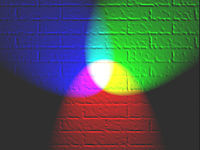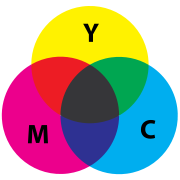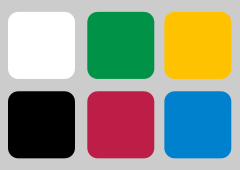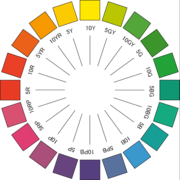
Shades of blue
Encyclopedia

RGB color model
The RGB color model is an additive color model in which red, green, and blue light is added together in various ways to reproduce a broad array of colors...
, X11 blue
X11 color names
In computing, on the X Window System, X11 color names are represented in a simple text file, which maps certain strings to RGB color values. It is shipped with every X11 installation, hence the name, and is usually located in <X11root>/lib/X11/rgb.txt.It is not known who originally compiled...
, is shown at right. This color is the brightest possible blue that can be reproduced on a computer screen, and is the color named blue in X11
X11 color names
In computing, on the X Window System, X11 color names are represented in a simple text file, which maps certain strings to RGB color values. It is shipped with every X11 installation, hence the name, and is usually located in <X11root>/lib/X11/rgb.txt.It is not known who originally compiled...
. It is one of the three primary color
Primary color
Primary colors are sets of colors that can be combined to make a useful range of colors. For human applications, three primary colors are usually used, since human color vision is trichromatic....
s used on the RGB color space
RGB color space
An RGB color space is any additive color space based on the RGB color model. A particular RGB color space is defined by the three chromaticities of the red, green, and blue additive primaries, and can produce any chromaticity that is the triangle defined by those primary colors...
, along with red
Red
Red is any of a number of similar colors evoked by light consisting predominantly of the longest wavelengths of light discernible by the human eye, in the wavelength range of roughly 630–740 nm. Longer wavelengths than this are called infrared , and cannot be seen by the naked eye...
and green
Green
Green is a color, the perception of which is evoked by light having a spectrum dominated by energy with a wavelength of roughly 520–570 nanometres. In the subtractive color system, it is not a primary color, but is created out of a mixture of yellow and blue, or yellow and cyan; it is considered...
. The three additive primaries in the RGB color system are the three colors of light
Light
Light or visible light is electromagnetic radiation that is visible to the human eye, and is responsible for the sense of sight. Visible light has wavelength in a range from about 380 nanometres to about 740 nm, with a frequency range of about 405 THz to 790 THz...
chosen such as to provide the maximum gamut
Gamut
In color reproduction, including computer graphics and photography, the gamut, or color gamut , is a certain complete subset of colors. The most common usage refers to the subset of colors which can be accurately represented in a given circumstance, such as within a given color space or by a...
of colors that are capable of being represented on a computer
Computer
A computer is a programmable machine designed to sequentially and automatically carry out a sequence of arithmetic or logical operations. The particular sequence of operations can be changed readily, allowing the computer to solve more than one kind of problem...
or television set
Television set
A television set is a device that combines a tuner, display, and speakers for the purpose of viewing television. Television sets became a popular consumer product after the Second World War, using vacuum tubes and cathode ray tube displays...
.
This color is also called color wheel blue. It is at precisely 240 degrees on the HSV color wheel, also known as the RGB color wheel. Its complementary color
Complementary color
Complementary colors are pairs of colors that are of “opposite” hue in some color model. The exact hue “complementary” to a given hue depends on the model in question, and perceptually uniform, additive, and subtractive color models, for example, have differing complements for any given color.-...
is yellow
Yellow
Yellow is the color evoked by light that stimulates both the L and M cone cells of the retina about equally, with no significant stimulation of the S cone cells. Light with a wavelength of 570–590 nm is yellow, as is light with a suitable mixture of red and green...
.
Blue (CMYK) (pigment blue)

Printing
Printing is a process for reproducing text and image, typically with ink on paper using a printing press. It is often carried out as a large-scale industrial process, and is an essential part of publishing and transaction printing....
, also known as pigment blue, is the tone of blue that is achieved by mixing process (printer's) cyan
Cyan
Cyan from , transliterated: kýanos, meaning "dark blue substance") may be used as the name of any of a number of colors in the blue/green range of the spectrum. In reference to the visible spectrum cyan is used to refer to the color obtained by mixing equal amounts of green and blue light or the...
and process (printer's) magenta
Magenta
Magenta is a color evoked by light stronger in blue and red wavelengths than in yellowish-green wavelengths . In light experiments, magenta can be produced by removing the lime-green wavelengths from white light...
in equal proportions. It is displayed at right.
The purpose of the CMYK color system is to provide the maximum possible gamut of color reproducible in printing.
The color indicated is only approximate as the colors of printing inks may vary.
Blue (NCS) (psychological primary blue)

Natural Color System
The Natural Color System is a proprietary perceptual color model published by the Scandinavian Colour Institute of Stockholm, Sweden. It is based on the color opponency description of color vision, first proposed by German physiologist Ewald Hering...
is shown at right (NCS 2060-B). The Natural Color System is a color system based on the four unique hues
Unique hues
In the opponent process theory of color, there are four unique hues – red, yellow, green, and blue – relative to which other hues are defined. Unique red is a red which appears to have no yellow or blue in it; unique yellow is a yellow which appears to have no red or green in it; etc.Color names...
or psychological primary colors red, yellow, green, and blue. The NCS is based on the opponent process
Opponent process
The color opponent process is a color theory that states that the human visual system interprets information about color by processing signals from cones and rods in an antagonistic manner...
theory of vision.
The “Natural Color System” is widely used in Scandinavia
Scandinavia
Scandinavia is a cultural, historical and ethno-linguistic region in northern Europe that includes the three kingdoms of Denmark, Norway and Sweden, characterized by their common ethno-cultural heritage and language. Modern Norway and Sweden proper are situated on the Scandinavian Peninsula,...
.
Blue (Munsell)

Munsell color system
In colorimetry, the Munsell color system is a color space that specifies colors based on three color dimensions: hue, value , and chroma . It was created by Professor Albert H...
(Munsell 5B) is shown at right. The Munsell color system is a color space
Color space
A color model is an abstract mathematical model describing the way colors can be represented as tuples of numbers, typically as three or four values or color components...
that specifies color
Color
Color or colour is the visual perceptual property corresponding in humans to the categories called red, green, blue and others. Color derives from the spectrum of light interacting in the eye with the spectral sensitivities of the light receptors...
s based on three color dimensions: hue
Hue
Hue is one of the main properties of a color, defined technically , as "the degree to which a stimulus can be describedas similar to or different from stimuli that are described as red, green, blue, and yellow,"...
, value (lightness
Lightness (color)
Lightness is a property of a color, or a dimension of a color space, that is defined in a way to reflect the subjective brightness perception of a color for humans along a lightness–darkness axis. A color's lightness also corresponds to its amplitude.Various color models have an explicit term for...
), and chroma (color purity), spaced uniformly in three dimensions in the elongated oval at an angle shaped Munsell color solid
Color solid
A color solid is the three-dimensional representation of a color model, an analog of the two-dimensional color wheel. The added spatial dimension allows a color solid to depict an added dimension of color variation...
according to the logarithmic scale
Logarithmic scale
A logarithmic scale is a scale of measurement using the logarithm of a physical quantity instead of the quantity itself.A simple example is a chart whose vertical axis increments are labeled 1, 10, 100, 1000, instead of 1, 2, 3, 4...
which governs human perception. In order for all the colors to be spaced uniformly, it was found necessary to use a color wheel with five primary colors--red, yellow, green, blue, and purple.
The Munsell colors displayed are only approximate as they have been adjusted to fit into the sRGB gamut.
Medium blue
Displayed at right is the web color medium blue.Dark blue
Dark blue is a shade of blue.The name comes from the word "Dark" (which originated from Old English dark, derk, deork; Anglo-Saxon dearc, and Gaelic
Scottish Gaelic language
Scottish Gaelic is a Celtic language native to Scotland. A member of the Goidelic branch of the Celtic languages, Scottish Gaelic, like Modern Irish and Manx, developed out of Middle Irish, and thus descends ultimately from Primitive Irish....
and Irish dorch, dorcha) and "Blue" (taken from French and originated from the Indo-European
Proto-Indo-European language
The Proto-Indo-European language is the reconstructed common ancestor of the Indo-European languages, spoken by the Proto-Indo-Europeans...
root bhlewos).
Navy blue
Navy blue is a very dark shade of the color blue. Navy blue got its name from the dark blue (contrasted with white) worn by officers in the British Royal Navy since 1748 (originally called marine blue before 1840) and subsequently adopted by other naviesNavy
A navy is the branch of a nation's armed forces principally designated for naval and amphibious warfare; namely, lake- or ocean-borne combat operations and related functions...
around the world
World
World is a common name for the whole of human civilization, specifically human experience, history, or the human condition in general, worldwide, i.e. anywhere on Earth....
.
The first recorded use of navy blue as a color name in English was in 1840.
Variations of blue in culture
Note: For blue in general in culture, please go to the main article on the color blueBlue
Blue is a colour, the perception of which is evoked by light having a spectrum dominated by energy with a wavelength of roughly 440–490 nm. It is considered one of the additive primary colours. On the HSV Colour Wheel, the complement of blue is yellow; that is, a colour corresponding to an equal...
Fashion
Fashion
Fashion, a general term for a currently popular style or practice, especially in clothing, foot wear, or accessories. Fashion references to anything that is the current trend in look and dress up of a person...
- Dark clothing for males such as black, brown, or dark blue business suits have become much more popular since the mid-1990s, as opposed to the pastel colored business suits worn in the 1970s by major leaders in such institutions as the United States CongressUnited States CongressThe United States Congress is the bicameral legislature of the federal government of the United States, consisting of the Senate and the House of Representatives. The Congress meets in the United States Capitol in Washington, D.C....
(the vast difference in the clothing worn in the 1970s as opposed to the 2000s can be readily seen by looking at a videotape of the Watergate hearings).

Law enforcement organisation
A law enforcement organisation is an organisation of parties, either individuals or other organisations or both, associated with law enforcement, typically with some common interest....
- In most parts of the world, police wear dark blue or, sometimes, medium blue uniforms.
Sexuality
Human sexuality
Human sexuality is the awareness of gender differences, and the capacity to have erotic experiences and responses. Human sexuality can also be described as the way someone is sexually attracted to another person whether it is to opposite sexes , to the same sex , to either sexes , or not being...
- In RussianRussian languageRussian is a Slavic language used primarily in Russia, Belarus, Uzbekistan, Kazakhstan, Tajikistan and Kyrgyzstan. It is an unofficial but widely spoken language in Ukraine, Moldova, Latvia, Turkmenistan and Estonia and, to a lesser extent, the other countries that were once constituent republics...
, the word for light blue, голубой, can be used to mean 'homosexual'.

